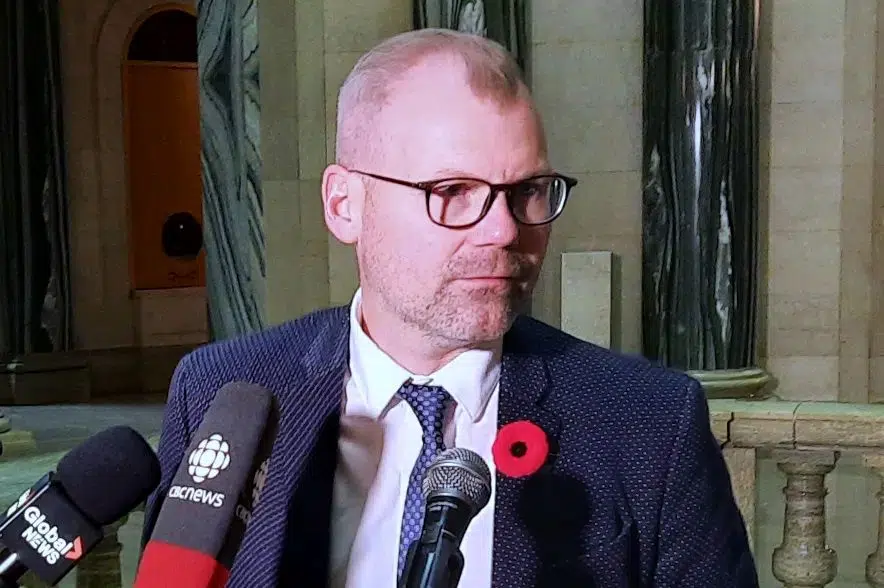As the weather continued its downward slide into winter on Monday, the Saskatchewan government announced it would be taking its next step in its long-standing opposition to the federal carbon tax, with SaskEnergy.
Last week, the prime minister announced a three-year exemption to the carbon tax on heating oil, which is mostly used in the Atlantic provinces. The Saskatchewan government said only about 0.4 per cent of customers use heating oil in this province.
On Monday, Premier Scott Moe announced on social media that he was calling on the federal government to expand that exemption to all home heating or he would take things into his own hands and direct SaskEnergy to stop collecting and remitting the carbon tax to the federal government as of Jan. 1.
Moe wasn’t made available to speak to local media on Monday, but Dustin Duncan, minister responsible for all the major Crown Corporations including SaskEnergy, did answer questions.
“Our position will be that this is about fairness for Saskatchewan families and if it’s fair for one part of the country to not have to pay the carbon tax, then it should be fair for us here in Saskatchewan as well,” said Duncan.
He said the province is giving the federal government two months to, essentially, “do the right thing” on this.
Last year, SaskEnergy collected and paid about $172 million in the carbon tax to the federal government. Duncan explained that is split between the Crown’s customers and is added to their monthly bills as a rate rider, which ends up being around a third of a customer’s bill.
Legally, SaskEnergy doesn’t have to collect that amount from customers but the issues will arise when the company refuses to pay that to the federal government, said Duncan.
The minister said he hopes the federal government doesn’t take this to court, but if it does it will be an interesting legal question. Duncan explained that, in the Supreme Court decision in 2021 which confirmed the constitutionality of the carbon tax, part of the reason the justices decided that way was because the tax was applied equally across the country.
“In the majority decision, part of the commentary from the justice that wrote the majority decision essentially said if the carbon tax isn’t applied equally across the country, then one province’s ability to essentially opt out of the carbon tax would go against the country’s ability to reduce greenhouse gas emissions, and so we all had to be in this together,” explained Duncan.
The minister said that with the announcement in Atlantic Canada, the federal government has undercut its own argument.
There are repercussions in the federal carbon tax legislation that can range from fines to criminal charges, and Duncan said the provincial government was working to figure out how to protect the board and officers at SaskEnergy.
980 CJME reached out to the federal environment minister’s office but didn’t hear back by the end of day Monday.
This is one of the few issues the Sask. Party government and Opposition NDP can agree on.
The NDP introduced a motion on Monday and all MLAs voted for it as well as the government’s amendment; both were against the exemption existing only for Atlantic Canada and supported the provincial government’s move.
Afterward, Sask. NDP Leader Carla Beck called the federal government’s actions “a measure of unfairness that simply can’t go without remedy.”
“It is a rather rare day when we agree in the Assembly but we did see that today,” said Beck.
The government motion included reference to the “Liberal-NDP” coalition government, but the NDP members still voted for it. Beck said there was enough of an agreement to move past it.
“This shouldn’t be about political gains, this should be about fairness and getting relief for the people of this province,” she said.
There are about two months before SaskEnergy takes action but Beck said things should be happening even before that.
“My expectation — and I think frankly a reasonable expectation for all people in this province and across the country — is that between now and then, both the prime minister and the premier put aside the tweet fights and actually get to the table and find a way to make this fair,” said Beck.
Beck said she had spoken to federal NDP Leader Jagmeet Singh’s chief of staff earlier Monday and had passed on her thoughts about the heating oil exemption and said it’s a serious issue and she expects it to be treated as such.











